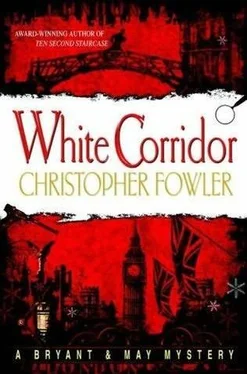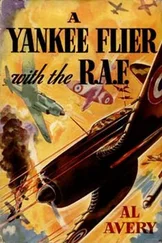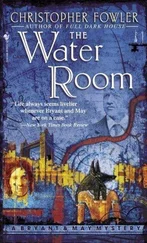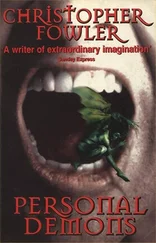Bryant buttoned the shapeless brown cardigan he had worn for the past twenty years, dragged his horribly moth-eaten Harris tweed coat over the top of it and finished the ensemble with a partially unravelled scarf in an odd shade of plasticine-mauve. The February weather had been unseasonably warm, but he was taking no chances. As he left the house, he hoped the week ahead would prove to be a busy one, for although he tired more easily these days, hard work made him feel alive. Retirement was an option only suitable for people who hated their jobs. Arthur loved working with his partner John May, and revelled in the fact that they performed a service no-one else in the city could offer. No-one had their arcane depth of knowledge, or was able to use it in the cause of crime prevention. Across the decades they had continued to close the cases few could understand, let alone solve. The Peculiar Crimes Unit was less of a secret now than it had been, but few really appreciated how it operated, or even what it did. It had been founded in a spirit of invention and experimentation, along with Bletchley Park and the Cabinet War Rooms, and would hopefully survive as long as London remained confounded by impossible crimes.
He tightened his scarf around his throat and, whistling an off-kilter air from The Pirates of Penzance, set off towards the tube station.
PECULIARITIES
“Mr. Bryant is so old that most of his lifetime subscriptions have run out.” Leslie Faraday, the increasingly portly liaison officer at the Home Office, poked about on his biscuit tray looking for a Custard Cream. “He’s only alive because it’s illegal to kill him.” He wasn’t used to being summoned to work so early, and needed tea before he could concentrate. “If we made him redundant he’d not be entitled to a full pension, technically speaking, because he’s working beyond our recommended statutory age limit. How would he be expected to survive?”
“Sentimentality can’t be allowed to stand in the way of modern policing procedures,” replied Oskar Kasavian, peering from the window into the tiled Whitehall courtyard. Faraday took a quick peek to see if the new supervisor in charge of Internal Security cast a shadow, as his cadaverous pale form created office rumours of supernatural lineage. “We’re not here to provide the inefficient with a living.”
This last remark confused Faraday, who believed that this was precisely the purpose for which Whitehall had been created. “Quite,” he said, “but surely we must take into account his long and illustrious career working with John May. One doesn’t force admirals into retirement simply because they no longer go to sea. We benefit from their experience.”
“Old generals are the cause of military disasters,” said Kasavian, drumming long fingers on the windowpane. “The elderly are weak precisely because they live in the past.” It was his absence of humanity others found so perturbing, as if Countess Bathory and Vlad the Impaler had mated to create the perfect bureaucratic hatchet man. “It would be prudent to act before someone causes a criminal outrage that could have been prevented by the PCU.”
“You sound as if you have something in mind,” said Faraday, who preferred to allow others to put forward their ideas, so that he could appear blameless if they failed.
“Clearly, I should have treated my last attempt to close the unit as a warning. The detectives have a few friends in senior positions, including, it seems, the Lord Chancellor, who are eager to protect the unit whenever it is threatened with closure. Therefore, we need recourse to a higher power.”
“Higher than the Lord Chancellor?” Faraday looked as if he could not imagine such a thing.
“Naturally, I have someone in mind,” said Kasavian, looming over the civil servant with threatening proximity. “Leave all the arrangements to me.”
“The trouble with Arthur Bryant is that he treats us all as though we’re uninvited guests gate-crashing his private world,” complained Raymond Land, the acting head of the Peculiar Crimes Unit, as he adjusted his navy blue golf club tie. “That’s what I resent most of all, the sheer lack of respect.”
Land had failed in his attempt to be transferred to another division following the unit’s success in capturing the murderer dubbed ‘the Highwayman’ in the national press. He reluctantly accepted the fact that he would probably be stationed in Mornington Crescent forever, but it didn’t stop him from vilifying the chief engineer of his fate. Land had arrived at the unit in the early 1970s, expecting to while away a single summer of lightweight criminal cases that fell below the radar and beyond the interest of his superiors. Instead, he had found himself thrust blinking and ill-prepared into the limelight of a series of sensational high-profile murder investigations. He blamed Arthur Bryant and John May, the founders of the unit, for poking him above the parapet of visibility, but managed to enjoy the national attention for a while.
However, during the Thatcher years, things began to go wrong for the PCU; a number of investigations were mishandled and the unit’s funding was cancelled. Suddenly, Raymond Land realised he was being scapegoated for a division now considered to be unreliable and unworthy of public trust. Arthur Bryant’s much-publicised willingness to hire psychics, necromancers, eco-warriors, numerologists, clairvoyants, crypto-zoologists, chakra-balancers and all manner of alternative therapists placed him in the firing line when his techniques failed. Over the years, only the gentle arbitration of his partner John May mollified the Whitehall mandarins.
The simple fact remained that Land was a bureaucratic phantom working in a highly unorthodox specialist police division, which made him redundant, the kind of man who needlessly checked his e-mails on trains and complicated things by interfering. He appreciated order, hierarchy, structure, accountability. What he got was a unit that behaved with the unruliness of a backpackers’ hostel. The PCU got away with murder because few of their suspects ever did. In short, they achieved results, and so long as the statistics continued to add up, they would continue to be funded in spite of their procedural irregularities. Thus, Land found himself paying for a success he had never wanted, while the engineers of his fate continued their wayward course through London’s criminal world, causing indignation and admiration in equal measure.
“On Bryant’s insistence we worked right through Christmas,” he told his wife, who had actually enjoyed the unusual yuletide peace in the house, “because he thought he’d found another victim of the Deptford Demon, a case that was supposedly solved in 1968! So now I feel entirely within my rights to do what I’m about to do.”
“And what is that, dear?” asked his wife, who was only half listening and longed for him to return to the office so that she could get on with painting the kitchen a disagreeable shade of heliotrope that she had spotted in the latest issue of Homes & Gardens.
“I’m closing the unit down for a week,” he explained in irritation. “A compulsory holiday. We’ve no outstanding investigations under way at the moment. It’s the perfect time to reorganise our operational systems.” Land loved the idea of reorganising things. He fantasised about clean paper-free offices where colour-coded computer files were backed up and alphabetised, as well as being catalogued by subject, theme, date and importance. Arthur Bryant was as likely to arrange papers by the colour of his correspondents’ eyes as by a nationally recognised system. Sometimes he wrote up his notes in naval code or medieval cryptograms. Land was convinced he did it just to be annoying.
Читать дальше












